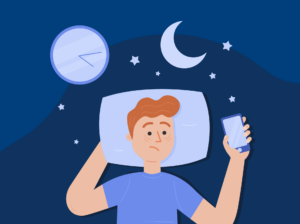It’s one of the most important questions of the day: is it possible to bone away depression?
The average person fundamentally understands the basics of depression. They get the relationship between brain chemicals and orgasms.
So it’s a logical question to ask if a great sex life can help your brain rectify its chemical imbalances and eventually help you become “happier.”
As you probably suspect, the reality is not quite so simple—there are many factors involved in the relationship between sex and depression, and it’s not a direct orgasm-to-joy ratio, as far as your neurotransmitters are concerned.
Still, there are some reasons to believe that sex may help you address particular types of depression in particular circumstances.
The Relationship Between Sex and Depression
The average person commonly understands that happy relationships make a person less likely to feel depressed. Likewise, the average person understands that sex is an important element of happy romantic relationships for most of the population.
This is pretty much where our base of understanding stops.
Surprisingly, there’s not a great wealth of information floating around about the frequency of sexual activity and how it affects mood disorders. Rather, we have some statistics that paint a vague outline.
One 2018 survey showed that 15 percent of men aged 18 to 89 had gone a year or more without sex, and more than eight percent had gone five or more years.
When researchers looked at causes, they found that entitlement, self-doubt, problematic communication patterns and a conflated understanding of the relationship between love and sex were among the main reasons.
Obviously, these things can also be associated with sadness, hopelessness and, at least in the bedroom, loss of interest.
Can Sex Prevent Depression?
To better understand the impact sex has on mental health, perhaps it’s a good idea to turn to a recent series of events that, for many people, was a mental health crisis: the COVID-19 pandemic.
In 2021, the Journal of Sexual Medicine published a study on the benefits of sexual activity on psychological health during the pandemic.
The study looked at thousands of people’s mental health through the lens of a web-based survey to determine whether there was a relationship between, well, relations of the sexual kind and mental wellbeing.
What researchers found was that both anxiety and depression scores were “significantly lower” for people who had an active sex life during the lockdown.
And the hard data shows some hard truths. The study concluded that while the pandemic and its initial lockdown phase “dramatically” impacted wellbeing and mental health in the psychological, relational and sexual spaces, it was the people who were sexually active that fared the best regardless of gender.
Of course, studies examining these things during a pandemic can be called out for the extreme nature of the conditions. But there’s some relevance to extremes. And the study used well-validated tools to reach their findings.
The study found that sexual intimacy and relationships were protective assets against anxiety, depression and feelings of isolation that many otherwise dealt with during the pandemic.
Other studies have found similar things—a 2020 study of more than 1,600 Spanish adolescents and young adults found an association between higher sexual satisfaction levels and lower instances of anxiety.
But a 2019 article put much of this in context by clarifying that for much of the scientific community, there are still too many unanswered questions, conflicts of interpretation as to what constitutes “healthy” sexuality, and called for new ways of examining the relationship between sexual dysfunction and mental health to better understand the cause-and-effect relationship between the two.
In a big-picture view, though, sexual intercourse or activity isn’t a medication, and it’s important to remember that “good” or “healthy” sex is sex that is consensual, enjoyable and happening when you’re ready.
There’s no mental health benefit to having sex you’re not ready for, or having sex before you’re ready, just because other people say so.
How to Deal With Depression for Real
Whether we’re getting enough sex in our daily lives is one thing.
But the benefits of sex for depression just aren’t there. Even in the cases where sex has proven a positive impact on mental health, it hasn’t been suggested as some sort of home medical treatment for depression.
The truth is, there’s no such thing.
Rather than getting to business in the bedroom, you may want to consider getting to business in a mental health professional’s office (no, not like that).
A mental health care professional will be able to give you better guidance on how to deal with depressive symptoms.
A word of caution: antidepressants like selective serotonin reuptake inhibitors (SSRIs) have been shown to be very effective in the management of depression and other mood disorders, but at a cost.
While these medications have been shown to be effective for treating depressive disorder, they do come with some side effect risks (specifically sexual side effects), including decreases in sexual function and sexual desire.
Sexual dysfunction may also be a symptom of depression — we know, we know, as if it wasn’t difficult enough. So, if you’re super focused on your “game” right now, you may want to speak to a health care provider about those concerns before starting a course of medication.
Sex and Depression: Final Thoughts
It’s probably not the answer you were hoping for, but for the moment, we can’t truthfully say if 365 days of sex or 100 orgasms will affect your depression. If anything, you’re likely to pull a muscle or suffer from dehydration before you’ll see your need for therapy or medication evaporate.
And there’s reason to be cautious about trying to bone away the blues. Certain sexual behaviors can have the opposite effect, and more sexual experience might not be the way to treat mental health issues.
A 2013 study looked at the relationship between having multiple sexual partners and things like depression, anxiety and substance dependence. Researchers found that higher numbers of partners were clearly linked to depression, anxiety and substance abuse later on.
This doesn’t mean that your sexual activity is going to cause you to have a mood disorder or a drinking problem—but it does mean you should be aware.
A better course of action might be considering therapy. Therapy can be done alongside medication (and sex, we imagine), and therapeutic practices like Cognitive Behavioral Therapy (CBT) have been shown to be effective in managing the thoughts and thought patterns that can be responsible for symptoms of depression.
A healthcare provider might also suggest lifestyle changes, some of which (like exercise) are considered as effective as medication in the treatment of mood disorders.
A final word of advice: keep sex as a recreational activity. There are too many effective treatments for depression available for you to put undue pressure on yourself or your partner/s to deliver miracle results from a sexual encounter.
Depression medicines are there to do the work. Keep the bedroom activities fun.





